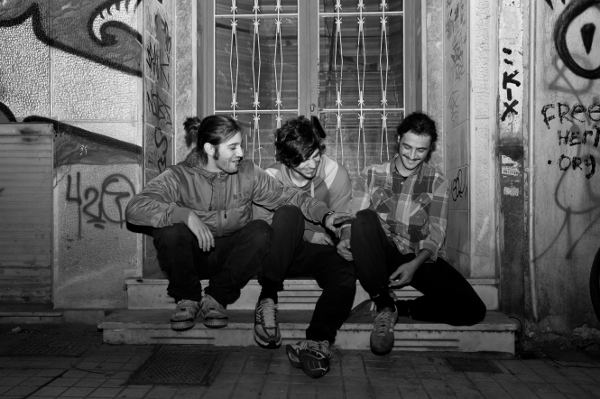
Yiorgos Kafetzopoulos, Diogenis Skaltsas and Ainias Tsamatis are Phoebos, Savvas and Andreas at Stelios Kamitsis’ film; The ‘jerks’. Three friends who want to leave Athens and go somewhere else, to another city, where everything is better and less complicated. In real life, they are actual friends and they don’t want to leave Athens and its chaos at all. This is their first movie, their very first interview and the first time that we have a recorder, while talking to each other. And this is something none likes. I press rec and they stop talking. The guys ‘erase’ all of my 22 questions and we end up looking at each other for two hours, sitting on a black sofa that has been more comfortable in the past. In the end, we decide to take it simple, no recorders, just with a few mixed-up notes. This is an interview/experiment, just like our choice to present you a movie that we haven’t even watched, just because these boys made us picture it and believe that we actually might like these ‘jerks’.
The film is based on a simple story; three childhood friends; decide to leave Exarchia, the neighbourhood they have grown up, for Berlin and we are made witnesses of their last night on the town, their twelve last hours in Athens. And of course before leaving, they need to deal with all things pending and if they happen to be ‘kolopaida’ then it’s a last minute thing possibly leading to unplanned chain of events.
Right from the start I express my concern on the choice of two overused areas in the script. They are concerned too. Yiorgos thinks they merely provide the background to a story that could be anywhere. Diogenis agrees but Aineas doesn’t. He gets frustrated, they end up having a discussion, trying to make sense of one another. They are not here with ready made answers, they don’t try imposing their side of things. Everything is on the table and this is liberating: big truths and important outcomes are not always necessary, especially when familiarity is not an issue.
We speak on the film’s central point: leaving. We talk about travelling and places we’ll definitely go as well as journeys we promised each other but never did. We talk about teams that break up, journeys being cancelled. ‘It’s not the one dropping out that cancels the journey. It’s the other people’s desire to remain together’ Diogenis says and to me this is a good enough definition of a team: it’s not about us or me leaving, it’s about sticking together. And this ‘togetherness’ might be the reason that made the ‘Kolopaida’ happen in the first place. Right in the middle of August in a ‘fed up’ city from a team of young people who feel strange seeing themselves in front of a camera.
During these twelve hours we follow them running up and down around Exarchia, organising their great ‘escape’, with their biggest drawback being reality itself. They can easily motivate each other with a ‘let’s get out of here’ phrase, but they’re still vulnerable to everything going on around; all things out of their control. ‘It is as if I promise us doing a thousand things at the same time and suddenly BAM! everything falls apart’ says Aineas and we end up admitting that it might be best to leave big plans aside. In truth there is no such thing as security. This is where we’re getting at. And to me this is a positive thought. One of the reasons they like Athens, is that it confirms this sense of security lack. A ‘brothel’ of a city in which we survive out of luck. An ideal city for the ‘kolopaida’? ‘ So who’s a kolopaido after all? If, say, someone does something bad to you and I go and throw three eggs on this head you’ll say “look at what this kolopaido did” in a good sense’ thinks Yiorgos and I can only agree.
Text: Danai Alaska | Photo: Dafni Anesti | Styling: Charalampos Nikolaou



